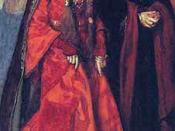Throughout Shakespeare's King Lear, there is a sense of renewal, or as L.C. Knights puts it, "affirmation in spite of everything," in the play. These affirmative actions are vividly seen throughout the play that is highly infused with evil, immorality and perverted values. These glimpses of hope seem to provide the reader with an underlying notion of human goodness that remains present, throughout the lurking presence of immorality and a lack of values. However, in the end it is questionable if these are true revelations, and if the affirmative notions are undermined, and thus less significant than the evil in which they are engulfed.
In Act I Scene I, the first glimmer of hope is revealed in the play at a time of madness, corruption and despair. In this scene, King Lear has created an environment of competition that promotes false flattery, among many other things as he divides his kingdom in relation to the amount of love his daughters profess to him.
King Lear in his willfulness and arrogance does not see the error that he makes in equating love with reward, in this competitive environment.
Cordelia is the only one of the three sisters who cannot fully participate in the competition to gain her father's inheritance by engaging in false flattery. Instead of trying to out due her sisters, she merely describes her love in relation to their filial bond. Although her father views this as a degrading insult and banishes her, it is shown that through her filial bond, she loves her father with more depth and sincerity than her eager, self absorbed sisters. Cordelia emerges amid the moral depravity and social decay as one who is honest and true to her beliefs.
In banishing his daughter Cordelia from the kingdom and taking away her inheritance,


